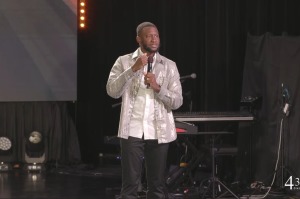I'm 60 and Compounding
For 23 years now, since 1983, I’ve created audio lessons on leadership. Every 10 years, when I hit a milestone age (40, 50, 60), I share my vantage point of life’s journey in the hopes it will lend perspective to younger leaders as they mature and grow.
I recently celebrated my 60th birthday and found myself thinking about aging. It seems the older you get, the more life comes into focus. As leaders, aging allows us to separate the important from the unimportant, to appreciate more and reach for less, and to allow those who are younger to step up to the plate and learn their lessons.
In this edition of Leadership Wired, you’ll find a summary of my thoughts after turning 40 and 50, but I’d like to focus upon my reflections after reaching 60 years of age.
I’m 60 & Compounding
Turning sixty, I look at my life and realize that I’m slowing down. I don’t have the energy I once had, and I simply can’t do as much as I once could. However, I also find that I’m entering a “compounding stage” in my life. I’m profiting from the investments I made when I was younger, and I’m watching them earn interest and steadily grow in value. I’m reaping the benefits of decisions which I made early in life and continue to manage to this day.
What Is Compounding In My Life?
1. Relationships
Through the years, I’ve tried to see the best side of people. Looking closely, we can flaws and defects in every person, but our relationships have a richer quality when we search for strength and beauty in the lives around us. As Ralph Waldo Emerson said, “Every man is entitled to be valued by his best moments.”
I’ve sought to relate on a heart to heart level with those around me. The dreams and passions stored within hearts are powerful keys which can unlock a wealth of potential. To understand the mind of a person look at what he has already achieved, but to understand the heart of a person look at what he aspires yet to do.
Over the course of my life I’ve built bridges with those around me. I’ve stayed connected with others, linked my friends with helpful contacts from my network, and refused to allow conflicts to sabotage my friendships. According to Joseph F. Newton, “People are lonely because they build walls instead of bridges.” Opening ourselves to others yields a satisfaction that’s missed when we surround ourselves with defenses.
I’ve consistently strived to give more than I receive. Keeping score is for games, not friendships. Avoid feeling entitled when you give, and don’t be too proud to accept when another person acts generously toward you.
I’ve tried to live for others. One is a little number, and when we live only for ourselves we lead small and shallow lives. Selfishness is a destructive disease with unpleasant symptoms. I agree with Helen Keller: “Life is an exciting business and most exciting when lived for others.”
2. Influence
Leadership is influence—nothing more, nothing less.
According to Jim Collins, the total number of philosophers who are significant in world history is approximately 135 to 500 persons; the smaller number if we take only the major figures in each world civilization; the larger one if we add secondary figures. Even if we add the minor figures in all of the networks, in all of the civilizations, the total is 2,700. In sum, between 150 and 3,000 people (a tiny fraction of the roughly 23 billion people living between 600 BC and 1900 AD) framed the major contours of world civilization. Clearly, the transformations here were top-down.
My focus has been to influence the influencers in the main areas of influence: religion, economics, government, family, media, education, sports. In my early years as a pastor, I had significant influence within church circles, but little elsewhere. As I’ve grown as a leader, I’ve learned to branch out and add value in additional areas.
3. Time
At 60, life begins to resemble a roll of toilet paper—the closer you get to the end, the faster it goes.
At 51, a heart attack helped me to understand the precious value of the time. Lying in the hospital, I remember thinking I had so much more to do, so much I wanted to give, but I didn’t know how much time I had remaining. Today matters more than we’ll ever know. Each second is a gift, and every day a treasured opportunity.
4. Perspective
As you get older, time speeds up but life slows down. The best way I know to explain this concept is through a sports analogy. In football, the decisions of the quarterback determine the effectiveness of the offense. When a college quarterbacks transition to the pros, they often go through a rough stretch, as they adjust to the faster pace of play. However, after a few years of experience, the game “slows down” for the quarterback as he is able to speed up his decision-making. Aging is similar. Even though everything around you appears to pick up speed, you can process experiences and prioritize what’s important more easily than ever before.
Perspective thoughts at 60:
(1) Life can only be understood backwards, but it must be lived forwards.
(2) Look at everything as though you might be seeing it for the first time and the last time.
The “First Time” look provides curiosity, excitement, anticipation, and learning. The “Last Time” look provides gratitude, memories, appreciation, and reflection.
(3) Separate the important from the unimportant.
(4) Laugh at yourself … everyone else is!
5. Giving
George Burns said it well: “When you stop giving and offering something to the rest of the world, it’s time to turn out the lights.” The worth of our lives comes by what we give. What we keep, we squander. Look for ways to impart value, be generous with encouragement, and hand out hope to those you lead.
6. Legacy
As a leader, when you hit 60, you start to see your legacy being formed. To leave an indelible legacy in the lives around you, I would suggest three activities:
(1) Choose today the legacy you want to leave others.
People will summarize your life in one sentence–pick it now! Don’t make your friends and family guess at your life’s purpose at your funeral.
The forming of my one sentence began late in the 1960’s and evolved into my life-sentence today. Here is the sequence:
“I want to be a great pastor.”
“I want to be a great communicator.”
“I want to be a great writer.”
“I want to be a great leader.”
As my world expanded my one sentence changed. I looked at my previous statements and realized that my true desire was to not to be great, but to add value to others. For a few years my one sentence was “I want to add value to people.” That statement evolved until I picked one sentence that I hope others will believe about me now and at my death.
“I want to add value to leaders who will multiply value to others.”
(2) Live today the legacy you want to leave.
Dr. Anthony Campolo tells about a sociological study in which fifty people over the age of ninety-five were asked one question: “If you could live your life over again, what would you do differently?” The open-ended question was met with a multiplicity of answers from the respondents, however, three answers emerged to dominate the results of the study:
1. If I had it to do over again, I would reflect more.
2. If I had it to do over again, I would risk more.
3. If I had it to do over again, I would do more things that would live on after I am dead.
(3) Appreciate today the value of a good legacy.
A life is short; history is long. Spend your life on pursuits that will outlive you. Elton Trueblood wrote, “We have made at least a start in discovering the meaning in human life when we plant shade trees under which we know full well we will never sit.”
Why Is My Life Compounding?
1. Attitude
The secret of positive compounding is contributing more than consuming.
I approach each day with the attitude that my success is determined by the seeds I sow, not the harvest I reap.
2. Personal Growth
The secret of your success is determined by your daily agenda.
3. Strength Zone
The only way to rise above average is to hone in on areas where you excel.
4. Teamwork
Teamwork makes the dream work. Your success depends upon those closest to you. Inspire a shared vision that binds you together for big dreams and audacious goals.
5. Partnerships
Mother Teresa, one of the greatest leaders of the 20th Century, embraced partnership with these words: “I can do what you cannot do and you can do what I cannot do. Together we can do great things.”
6. Credibility
When you consistently combine character with competence, you establish credibility.
Closing Thoughts:
Life compounds positively or negatively. The choice is up to you. The age at which you make your choices will determine the magnitude of the compounding.
1. Choices made during youth yield enormous compound interest.
2. Choices made in the middle of life earn a small degree of compound interest.
3. Choices put off until late in life don’t have time to compound.
This article is used by permission from Dr. John C. Maxwell's free monthly e-newsletter Leadership Wired available at www.injoy.com.
__________________________________________________________
Called the nation's foremost expert on leadership, John C. Maxwell is founder of The INJOY Group, a collection of three distinct companies that employ 200 people and provide resources and services that help people reach their personal and leadership potential. In addition to building a successful organization, John has authored more than thirty books, including the New York Times best sellers The 21 Irrefutable Laws of Leadership and Failing Forward.





























